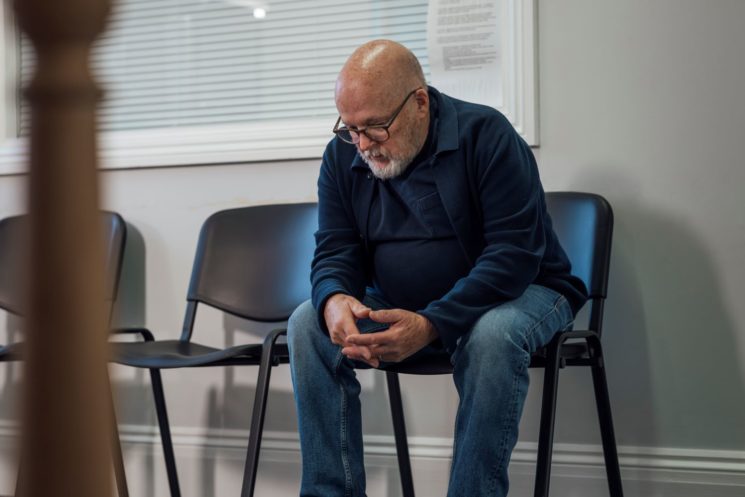Radiotherapy for lung cancer: Non-surgical treatment options
Surgery is not always the most appropriate method of treatment for lung cancer; radiotherapy is a non-invasive option that can provide a cure for early-stage cancer.

Surgery is not always the most appropriate method of treatment for lung cancer – it depends on a number of factors, including the type of cancer you have, its size and location, whether it has spread (metastasised), and your overall health.
There are several advanced, non-surgical treatments available that can prove effective in curing or controlling lung cancer, while avoiding the need for invasive surgery. Radiotherapy is an alternative to surgery that can also offer a cure for early-stage lung cancer.
The application of non-surgical treatments is evolving all the time to offer patients a cure whenever possible, and, in non-curative situations, to keep you feeling well and delay the need for new drug treatments for lung cancer for as long as possible.
Oligometastatic and oligoprogressive lung cancer
In the past, when lung cancer metastasised, drugs like chemotherapy or low-dose radiotherapy would have been offered to control the metastasis for a period of time and reduce symptoms, but not attempt to eradicate the metastatic deposit.
There are two terms commonly used to describe some types of metastatic lung cancer: oligometastatic and oligoprogressive. ‘Oligo’ is derived from the Greek word ‘oligos’, which means ‘few’.
Metastasis is the spread of cancer cells from their site of origin to another part of the body. Therefore, oligometastatic lung cancer means that the cancer has spread to a few other areas of the body, but not widely.
Oligoprogressive lung cancer means that the majority of the cancer has responded well to treatment, but small areas of the cancer have returned or worsened (progressed).
Both types of disease often respond well to radiotherapy treatments, as the cancer is limited to a small number of areas that can be targeted with advanced precision.
Radiotherapy for lung cancer
Radiotherapy uses high-energy radiation to eliminate cancer cells. It can be used to eliminate tumours, shrink tumours before surgery, or to eliminate any remaining cancer cells following chemotherapy or surgery.
Stereotactic ablative radiotherapy (SABR)
Stereotactic ablative radiotherapy (SABR) is an advanced type of radiotherapy that deploys beams of high-dose radiation with millimeter accuracy, allowing for exceptional precision when eliminating tumours. Because the beams are directed at the tumour from different angles, the tumour receives a high dose of radiation while exposure to the surrounding healthy tissues is significantly reduced. SABR is also sometimes referred to as stereotactic body radiation therapy (SBRT).
SABR is a valuable treatment option for oligometastatic lung cancer which is able to accurately target tumours in the lungs, bones, lymph nodes, liver, adrenal glands, and spine. This helps reduce the cancer spread, thus prolonging life span and improving quality of life.
SABR is delivered using a machine called a linear accelerator. At Cromwell Hospital, we use a linear accelerator called the Varian Edge which has several benefits including state-of-the-art targeting capabilities, exceptional precision, and real-time tracking of the tumour position.
Stereotactic radiosurgery (SRS) for lung cancer brain metastases
Despite its name, stereotactic radiosurgery (SRS) doesn’t involve surgery. While traditional radiotherapy requires multiple treatment sessions, SRS delivers several highly concentrated doses of radiation to the brain in one session. Rarely, patients may require a few sessions. It is often referred to as ‘brain-sparing’ radiotherapy due to its ability to preserve quality of life in patients with brain tumours.
At Cromwell Hospital, SRS is delivered through a linear accelerator called the Gamma Knife Icon, which uses up to 192 tiny beams of gamma radiation to destroy tumours with exceptional precision. The procedure is non-invasive and can treat difficult-to-reach areas, enabling a faster recovery and less side effects compared to alternative treatment options like surgery.
Radiotherapy for symptom management
In patients with advanced lung cancer, radiotherapy can be used to control symptoms and improve quality of life. This may be referred to as supportive or palliative radiotherapy.
Advanced cancer can often cause significant pain if it spreads to the bones and compresses nerves. Therefore, palliative radiotherapy can be especially helpful in controlling this type of pain. This may allow affected patients to enjoy more of their daily life and activities, also improving emotional wellbeing in the process.
Lung cancer screening
If you are at risk of developing lung cancer, you should attend annual screenings to identify any problems at an early stage. People at risk of developing lung cancer are those who have a history of heavy smoking, currently smoke, and are over 50 years old.
A lung cancer screening involves a consultation with a respiratory specialist and a low-dose one-part CT scan. If required, your results will be reviewed by a multidisciplinary panel of experts.
If you are found to have lung cancer, you will be swiftly referred on to our oncology department for treatment.
About the consultant
Dr James Wilson is a consultant clinical oncologist at Cromwell Hospital and a founding member of The Chest and Lung Group. His NHS base is University College London Hospital (UCLH).
Dr Wilson's approach to oncology is patient-centric, ensuring that each treatment plan is not only based on the latest scientific research but also individually tailored to meet the needs and circumstances of his patients.



